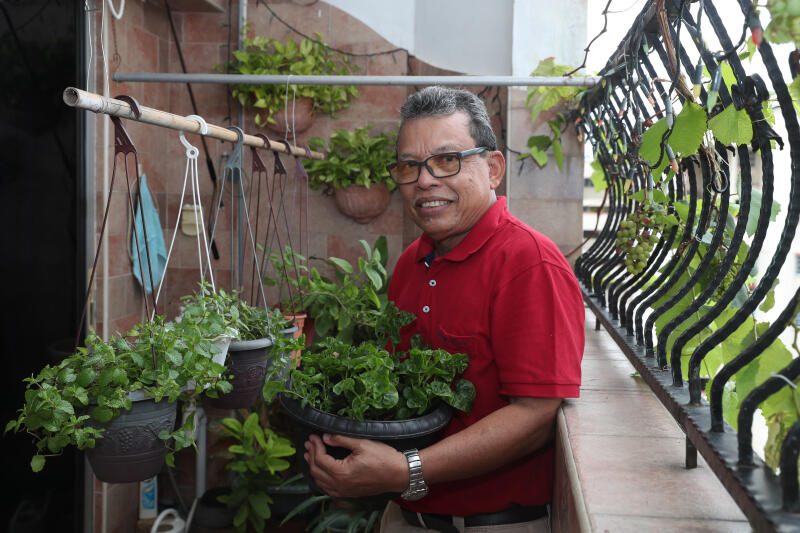Safeguarding Singapore's food security at the national and household levels during coronavirus pandemic
Sign up now: Get ST's newsletters delivered to your inbox

Mr Asari Bin Rafie, a part time taxi driver and home-based gardener.
ST PHOTO: TIMOTHY DAVID
Follow topic:
SINGAPORE - Call it grape expectations but avid gardener Asari Rafie was sure he could defy the rigours of Singapore's tropical climate to produce a bumper crop from the vines creeping along his balcony railings.
And so it proved with bunches of succulent grapes soon to be ripe for the picking.
That would be an improbable feat for most people but Mr Asari's green thumb has been meeting challenges like that since 1998, turning out rice, tomatoes and lady's fingers in his home or at the nearby community garden.
He has become so adept at gardening that he is almost self-sufficient, needing to buy only a little extra produce from markets.
The 70-year-old part-time taxi driver said gardening has taught him the value of food - a lesson many Singaporeans are now also learning amid the disruptions to food supplies due to the Covid-19 pandemic.
"Nowadays, people just go to the supermarkets to buy food. It's very convenient, and I often see people wasting food, throwing it away," said Mr Asari.
The need to reduce food waste to boost Singapore's resilience has become a far more urgent issue in recent weeks.
As Deputy Prime Minister Heng Swee Keat noted after a visit to a local fish farm earlier this month (April): "We have to think about how we can reduce our own food waste. And in that way, we can meet our needs without excessive strain on the system."
EVERY INDIVIDUAL'S FIGHT
Food security expert Paul Teng, an adjunct senior fellow at the S. Rajaratnam School of International Studies at the Nanyang Technological University, said disruptions to food supply during the pandemic are related to labour shortages.
Manpower is needed for planting and crop harvesting, as well as processing and shipping other food items, so measures that restrict the movement of people could affect supplies.
Singapore's food security strategies have enabled it to tide over supply chain disruptions caused by Covid-19 so far, said Professor Teng.
"But if the crisis is a protracted one lasting more than six months, there might be a need for people to step up to supplement the government's efforts," he added.
For instance, even as the Government implements measures to safeguard national food supplies, individuals can also take small steps at the household level by, for instance, growing their own produce or being open-minded about consuming more frozen food instead of fresh items.
Prof Teng said community gardens could also provide a buffer in case of global food supply shocks, citing how such gardens had helped people in Europe get through such periods during World War II.
Moreover, while high-tech farming initiatives may take time to ramp up, boosting local production by encouraging community gardening could be achieved over the shorter term.
"Vegetables, especially locally adapted and indigenous vegetables, are relatively easy to grow and maintain, and most have high nutritive value," he said. "In times of crisis, getting more community participation to deal with the crisis is important."
Mr Ng Cheow Kheng, group director for horticulture and community gardening at the National Parks Board (NParks), said the nationwide gardening movement has grown from one garden in 2005 to more than 1,500 community ones today.

<p>Mr Asari Bin Rafie, 70, a part time taxi driver and home-based gardener with his tomato plant.</p> <p>ST20200404_202049893560/augarden/Audrey Tan RP/Timothy David Food security is in the hands of individuals too. From growing their own plants at home to reducing food waste. Profile of Mr Asari Bin Rafie, 70, a part time taxi driver and home-based gardener. ST PHOTOS: TIMOTHY DAVID</p>
PHOTO: ST
Community gardens are tended by volunteers and can be found across the island in public and private housing estates, schools and premises of organisations.
While community gardens are not permitted to sell their edible produce as they do not have a farm licence issued by the Singapore Food Agency, the harvest is usually shared with fellow gardeners and neighbours.
Take Choa Chu Kang Park community gardeners. They recently came together to donate more than 120kg of their harvest to social organisations providing front-line services such as the Bethany Nursing Home, said NParks' Mr Ng.
He added: "Gardeners who wish to learn more are welcome to explore our series of gardening videos for tips and techniques, available on our NParks website and YouTube channel."
FEEDING THE NATION
Singapore is well aware of its vulnerability to global supply shocks given it is a small island nation that imports more than 90 per cent of its food.
A Ministry of Trade and Industry (MTI) spokesman said a multi-pronged strategy has been put in place over the years to ensure that there will be enough food and essential supplies for everyone as long as people buy in a responsible manner.
For example, each major rice importer must participate in the rice stockpile scheme, which ensures there is an adequate supply, she said, adding that Singapore ensures the supply of other items by stockpiling, diversification and local production.
Another strategy, said the MTI spokesman, is for Singapore to work with like-minded partners to ensure that supply chains remain intact even during global crises such as the Covid-19 pandemic.
Singapore issued a joint statement with Australia, Brunei, Canada, Chile, Myanmar and New Zealand on March 25 committing to keeping trade lines, including air and sea freight, open to facilitate the flow of goods such as food and medical supplies.
The MTI spokesman added: "While we may have to make some adjustments to our choices in the short term, we have sufficient food supplies for all Singaporeans and will continue to review our strategies to ensure adequate supplies."

